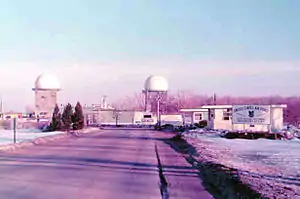Watertown Air Force Station
Watertown Air Force Station is a closed United States Air Force ADCOM General Surveillance Radar station 3.5 miles (5.6 km) south of Watertown, New York. Prior to the Air Defense squadron inactivating on 1 November 1979, the station was reassigned to Tactical Air Command which maintained the Ground Air Transmitter Receiver until early 1984 (now a firefighter training site).[4] A New York State jail opened at the site c. 1983.
| Watertown Air Force Station | |
|---|---|
| Part of 1951-1968: 1968-1979: 1979-1984: | |
| Watertown, New York | |
 2 radomes and the main gate with guard shack (1975) | |
| Coordinates | 43°55′31″N 075°54′33″W |
| Type | Long Range Radar Site |
| Code | RP-49: 1950 ADC permanent network[2][3] Z-49: 1963 July 31 NORAD network |
| Site information | |
| Controlled by | |
| Site history | |
| Built | 1952 |
| Built by | U.S. Air Force |
| In use | 1952-1979 |
| Garrison information | |
| Garrison | Watertown, New York |
| Occupants | 655th Radar Squadron |
It was a part of the 21st RCC (NORAD Regional Control Center) a SAGE network, located at Stewart AFB.[3]
History
Lashup Radar Network site L-6 was established in June 1950[5] at the Pine Camp military installation (renamed Fort Drum in 1951)[6] and operated by the 655th Aircraft Control and Warning Squadron using an RCA AN/TPS-10A Radar. After construction adjacent to Fort Drum in June 1952, the operation moved to the Air Force Station, one of the first twenty-four Air Defense Command radar stations of the permanent network established 1950-1951 after the USAF directed construction of the sites on December 2, 1948. Watertown AFS used AN/FPS-3 and AN/FPS-5 radars for warning and ground-controlled interception. In 1958 this site was operating with AN/FPS-20 search radar and General Electric AN/FPS-6 Radar for height-finding.
During 1959 Watertown AFS began providing Semi Automatic Ground Environment (SAGE) data to DC-03 at Syracuse AFS, New York, and the squadron was re-designated as the 655th Radar Squadron (SAGE) on 1 February 1959. In 1959 a 2nd AN/FPS-6 was added and in 1961, the FPS-20 was upgraded to an AN/FPS-66. One height-finder radar was replaced by an Avco AN/FPS-26 Radar in 1963. In 1964 the AN/FPS-66 was replaced by a Westinghouse AN/FPS-27 Radar. The other AN/FPS-6 height-finder radar was retired in 1964.[7]
In addition to the main facility, the Watertown squadron operated two unmanned AN/FPS-14 (P-49A) and AN/FPS-18 (P-49B) Gap Filler sites:
- Suttons Corner, NY (P-49A) 43°21′17″N 076°17′09″W
- Oswegatchie, NY (P-49B) 44°10′01″N 075°07′08″W
Air Force units and assignments
Units:
- 655th Aircraft Control and Warning Squadron, activated 8 December 1949 at Pine Camp, NY (L-6)
- Moved to Watertown AFS, NY, 1 February 1951
- Redesignated 655th Radar Squadron (SAGE), 1 February 1959
- Redesignated 655th Radar Squadron, 1 February 1974
- Inactivated 1 November 1979
Assignments:
- 540th Aircraft Control and Warning Group (32d Air Division), 18 Dec 1949
- 32d Air Division, 6 February 1952
- 4711th Air Defense Wing, 16 February 1953
- 32d Air Division, 1 March 1956
- Syracuse Air Defense Sector, 1 September 1958
- Boston Air Defense Sector, 4 September 1963
- 35th Air Division, 1 April 1966
- 21st Air Division, 19 November 1969 - 31 December 1979
References
- In March 1949, Congress authorized the construction of a permanent radar network[3] ("ADC radar site" P-1 was at McChord AFB from June 1, 1950, to April 1, 1960.)
- "Google".
- In March 1949, Congress authorized the construction of a permanent radar network ("ADC radar site" P-1 was at McChord AFB from June 1, 1950, to April 1, 1960.)
- Winkler, David F; Webster, Julie L (June 1997). Searching the Skies: The Legacy of the United States Cold War Defense Radar Program (Report). U.S. Army Construction Engineering Research Laboratories. Archived from the original on December 1, 2012. Retrieved 2012-03-26.
- "Information for Watertown AFS, NY". Air Defense Radar Stations. Radomes.org. Retrieved 2012-05-08.
-
 This article incorporates public domain material from the Air Force Historical Research Agency.
This article incorporates public domain material from the Air Force Historical Research Agency. - compiled by EM, Marc. "[untitled webpage 5]". A History of the Jefferson County Region. MarcMNY.tripod.com. p. 5. Retrieved 2012-05-08.
- compiled by Johnson, Mildred W. (31 December 1980) [February 1973: Cornett, Lloyd H. Jr]. A Handbook of Aerospace Defense Organization 1946 - 1980 (PDF). Peterson Air Force Base: Office of History, Aerospace Defense Center. p. 33 ("1961…1 April - Los Angeles ADS became operational."). Retrieved 2012-03-26.
